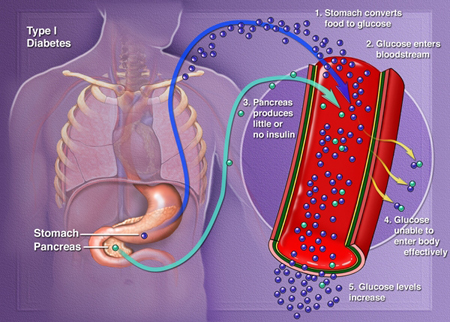
Will There Be a Cure for Type 1 Diabetes Soon? Exploring Recent Advances and Future Possibilities


The quest for a cure for type 1 diabetes has gained significant momentum in recent years, with researchers exploring various innovative therapies. Advances in cellular therapies and stem cell research are providing new hope. While a definitive cure may still be years away, there is optimism that breakthroughs could emerge as early as 2025.
Many patients are closely watching developments in islet cell transplantation and therapies that reduce the need for insulin. Current treatments show promise in improving quality of life and managing the disease. Ongoing research seeks to answer the pressing question: will diabetes be cured in the next ten years?
As the scientific community continues to innovate, both patients and experts remain hopeful. New studies and emerging technologies are paving the way for potential cures that may transform the landscape of type 1 diabetes care. The journey toward a complete cure may be challenging, but the future holds promise for those affected by this condition.
Type 1 diabetes is characterized by the autoimmune destruction of pancreatic β cells, leading to insulin deficiency. Understanding its pathophysiology and current treatment approaches is crucial for grasping the challenges in finding a potential cure.
Type 1 diabetes occurs when the immune system mistakenly attacks and destroys insulin-producing β cells in the pancreas. This results in insufficient insulin levels, leading to elevated blood glucose levels.
Key factors involved in this process include:

Without insulin, the body cannot effectively regulate glucose levels, causing symptoms such as frequent urination, extreme thirst, and fatigue. Long-term high blood sugar can result in serious complications, including heart disease, nerve damage, and kidney failure.
Management of type 1 diabetes requires lifelong insulin therapy, often administered through injections or insulin pumps. The goal is to maintain blood glucose levels within a target range.
Current treatment strategies include:
Despite advancements, no cure exists. Research explores potential interventions, such as cellular therapies, which aim to restore insulin production or modify the immune response. Promising clinical trials are underway, offering hope for future breakthroughs in treatment.
Recent research in type 1 diabetes focuses on innovative therapies and potential breakthroughs that could alter the treatment landscape. Significant strides have been made in understanding the disease's biology and developing new interventions.
Innovations in type 1 diabetes research include the FDA's approval of Lantidra, the first cellular therapy designed for adults. This breakthrough of stem cell therapy for Type 1 Diabetes offers hope for individuals unable to maintain average blood glucose levels using traditional insulin therapy.

Source: Fitterfly
A study employing a cell barcoding technique has unlocked new possibilities for high-throughput material screening. This advancement could lead to novel treatment strategies targeting the autoimmune mechanisms responsible for beta-cell destruction.
Additionally, Teplizumab, an immunotherapy drug, was approved in 2022. It demonstrated effectiveness in delaying the onset of type 1 diabetes by an average of three years in at-risk individuals, indicating potential preventive strategies.
Several clinical trials are actively exploring potential cures for type 1 diabetes. Ongoing research investigates the efficacy of stem cell therapies, which aim to regenerate pancreatic beta cells. These approaches focus on reversing the autoimmune attack that leads to insulin deficiency.
Researchers are also exploring combination therapies that may enhance the effectiveness of existing treatments. For instance, trials combining immunotherapies with conventional insulin administration are underway to maximize patient outcomes.

Source: Sanford Research
Notably, recent studies have shown promise in gene therapy applications as well, which could potentially address the underlying genetic factors contributing to the disease. This multifaceted research approach could pave the way for more effective treatments or even a viable cure for type 1 diabetes.
Recent developments in medical science suggest that the prospects for a cure for type 1 diabetes are becoming increasingly viable. Innovations in treatment and research may pave the way for breakthroughs within the next decade.
Innovative approaches to treating type 1 diabetes are gaining traction. Recent studies have shown promising results with therapies like stem cell treatments, which have reversed the disease in patients. In one notable case, a woman experienced a reversal of symptoms, a first in this field.
Additionally, new cellular therapies have received FDA approval, aiming to improve blood glucose management. These treatments are designed to restore insulin production, reducing dependence on daily insulin injections. Ongoing research in genetics and immunology also aims to prevent the autoimmune response that attacks pancreatic β cells.
Predictions regarding a cure for type 1 diabetes vary among experts. Some believe significant advancements could occur by 2025 or within a decade, fueled by rapid innovation and research funding. Clinical trials continue to explore the potential for a functional cure, emphasizing the possibility of long-lasting remission of the disease.
The outlook remains cautiously optimistic. Many researchers emphasize that while a complete cure may not be imminent, effective treatments that significantly improve the quality of life for those affected are expected soon. As science evolves, the potential for eradicating or at least managing type 1 diabetes remains an active area of investigation.
Shiney Wellness stands out as the no. 1 stem cell therapy center, committed to offering innovative treatments that harness the body's natural healing potential. With a team of highly skilled medical professionals, Shiney Wellness provides personalized care in a state-of-the-art facility. They specialize in regenerative therapies designed to alleviate pain, support recovery, and improve quality of life. By using cutting-edge technology and adhering to the highest standards of safety, Shiney Wellness ensures optimal results for patients seeking alternative solutions for chronic conditions. Trust Shiney Wellness as your partner in achieving enhanced wellness through stem cell therapy.

